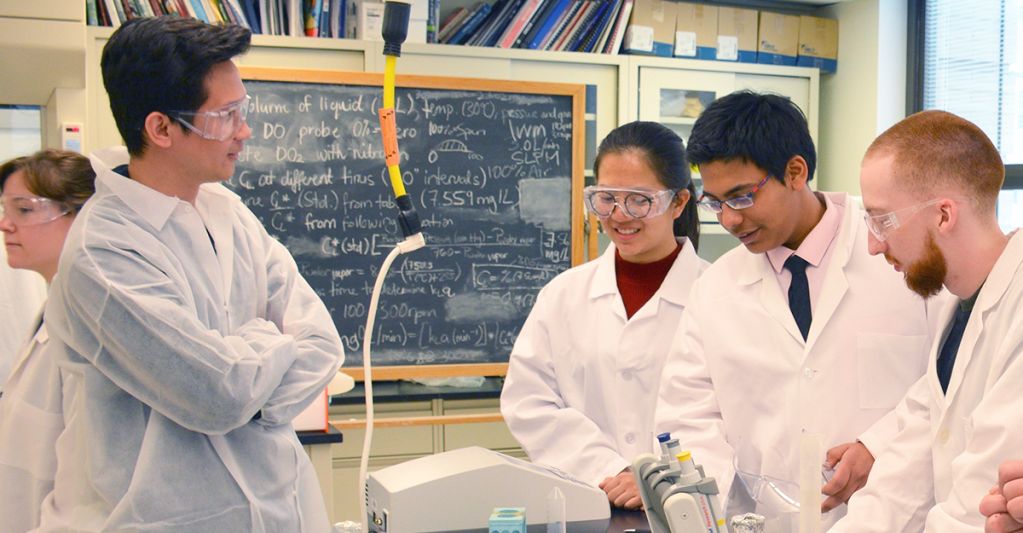
The Master of Biotechnology program curriculum ensures that students gain core knowledge while also providing flexibility to cater to students' specific interests and career goals.
Plan of Study
A minimum of 30 credits is required in the Master of Biotechnology degree, including a capstone research project. A typical plan of study designed for completion in 1.5 years:
Year 1 - Fall semester
MCIBS 591 Ethics, Rigor, Reproducibility, and Conduct of Research in the Life Sciences (2 credits)
MCIBS 593 Molecular Biology Laboratory (3 credits)
MCIBS 590 Colloquium (2 credits)
Required online CITI-RCR (Collaborative Institutional Training Initiative-Responsible Conduct of Research) training (0 credits)
Required Career Development Workshops and Career Preparation Assessment (0 credits)
Electives (6-7 credits)
Year 1 - Spring Semester
BMB 400 Molecular Biology of the Gene (2 credits)
BIOTC 479 Methods in Biofermentation/Bioprocessing (3 credits)
MCIBS 571 Current Issues in Biotechnology (2 credits)
Electives (7-8 credits)
Year 1 - Summer
Internship or Co-op (0-1 credits)
Year 2 - Fall Semester
Internship or Co-op, continued (2-5 credits)
Required core courses cover topics ranging from science to the biotechnology industry to professional development:
- Molecular Biology: intensive lecture and laboratory course gives students a thorough understanding of the core concepts, principles, and research techniques in molecular biology
- Bioprocessing/Biofermentation: intensive lecture and laboratory course on bioprocessing principles and development in a dedicated biofermentation/bioprocess development teaching laboratory
- Colloquium: features invited scientists from around the world who are at the forefront of research in the life sciences; students learn critical analysis of related scientific publications and technologies and develop oral presentation skills in science
- Research Ethics in the Life Sciences: students learn and deliberate on the broad ethical and legal issues in life sciences research and their many applications
- Biotechnology Industry Lectures: invited industry speakers and experts educate students on the state-of-the-art research in biotechnology and the business, intellectual property, regulatory, legal, social, and ethical aspects of biotechnology, as well as advise students on professional development strategies for successful careers in the industry
- Career Development Workshops: career workshops and career assessments are non-credit requirements for students in the Master of Biotechnology program; these happen both in the fall and spring semesters, especially prior to on-campus career fairs and internship/co-op application period and prior to graduation from the program
- Research Project: a minimum six-month full-time research internship or co-op culminating in a research paper constitutes the capstone requirement for the degree; these co-ops or internships are usually done off-campus in industry, government, or other academic and non-profit institutions
Elective courses allow students to focus on specific areas of interest in biotechnology:
Beyond the core required courses, students take advantage of diverse course offerings in various colleges and departments on campus according to their specific areas of interest and career goals; some students choose to concentrate on either agricultural biotechnology or biomedical applications, while some choose to pursue a broader and more diversified program of study. Agricultural biotechnology, bioengineering, business, cell and molecular biology, entrepreneurship, genomics and bioinformatics, immunology, infectious diseases, project management, statistics, toxicology, food science, health and human development, regenerative medicine, animal cell culture, and cancer biology exemplify some of the areas from which students choose their elective courses. Individual studies in a research faculty member's laboratory on campus is a strongly recommended elective to further strengthen the research and technical preparation of students.
Capstone requirement:
A research project in industry, government, nonprofit, or academia during the internship/co-op period constitutes the capstone requirement for the degree. The research project must be conducted full-time for a minimum of six months; a research paper is required at the culmination of the project. Students' grades are based on the quality of their research papers as assessed by the academic advisor or faculty member in charge and on the performance evaluation by the research supervisor.